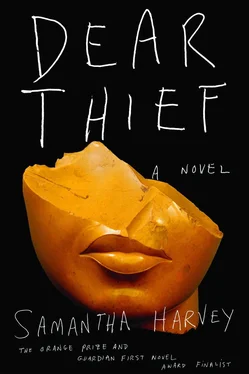No, let me make it clear. I was not docile, or passive. I dressed myself up as the forgiving sort, but there is forgiving, and there is also tolerating, which is forgiveness in rags. And then there is something else, which is nothing short of a heartless fascination with somebody’s downfall. On our journey back from Spain, looking at you as you slept, I began to realise that if it was your fate you wanted, you could have it — your sad, sordid, wretched fate of self-annihilation. In my defence, Butterfly, you made it so easy, I never once had to lift a finger. I would never have chosen that path for you, I hope you know it. I have loved you, but you have not at any point made this the obvious or logical choice, and when I went into your room that January morning in 1985 I was not even sorry to find your bed stripped and your things gone.
Maybe if this letter is a form of defence it is only to object that I may be unkind but I am not weak, as I know you think I am. I am unkind because I didn’t want to forgive you or Nicolas, but I am not weak, because forgiveness of you was never my choice. You cannot forgive somebody who doesn’t ask to be forgiven. There is no point leaving somebody who agrees that you should leave. We can argue with a piece of bad reasoning in another, but we cannot argue with somebody who acts under the influence of love, as Nicolas did. I might almost have felt sorry for him after you left, if he had invited even a moment’s pity. In my ignorance and my hardness I hadn’t realised what effect you’d had on him, what you had given him, which I see now as the gift of risk and loss. Finally he stopped believing that you would come back, or that he would find the cow shin or the other half of his peacock figurine; he lost his foolishness and he broadened and aged like a tree.
Even weeks after you left he would comment that he could smell you on things, that sharp smell of saplings, of bitter green wood on the cushion on the armchair where you had taken to resting your head.
Yannis’ place is as clean as a child’s conscience. Together we spent today scrubbing it from top to bottom so he can try to sell it as a going concern rather than fold the business and give up the lease. This is after almost two weeks of deliberation and long phone calls to his wife in Crete, who is unbending. Have you ever tried to wield a cloth with a broken heart? I can tell you it cleans at half the rate. It was as if Yannis were trying to put back the grease the cloth was taking off, which was after all his grease, his footprints on the lino by the fryers, his fingerprints on the till.
‘A year,’ he said, ‘I will give it a year. And if my wife and Crete are giving me a headache I will come back.’
I told him this was a fair plan, but I know he will not come back because certain moves are irrevocable. I don’t know why this should be, only that we know in our hearts when they are, and the more we tell others how easy a thing is to undo, the more we know we never will undo it. I will miss him. Not only him, but the others here we sometimes play cards with — Christos, a Greek man Yannis knows from the cash-and-carry; Tam, a gentle Jamaican English teacher in his fifties who discovered Yannis’ shop through a love of baklava and who recently lost his wife; then there is the Nigerian, Muyi, whose suits are from House of Fraser, if you remember, and his friend Winnie. And others, but it is too late in the letter to tell you about them now.
Not that I know any of them well, except Yannis, but sometimes it is the little rituals you miss most when they end. The scrape of coppers across the metal tabletop, Winnie using her thighs and the table as percussion to the traditional Ugandan songs she sometimes breaks into, olive-oil fingerprints blooming on the top left back of the nine of spades and just left of centre on the two of diamonds, and everybody noticing and noting and pretending they hadn’t noticed or noted; Muyi’s gifts of salted caramel truffles from some improbably priced place on Madison Avenue (he has brothers in New York and crosses the Atlantic probably more often than I cross the Thames), his enthusiasm for New York speakeasies, his intolerance of conservative white men, his vehement refutation when Yannis calls himself a conservative white man, despite that Yannis wants more than anything to be one. Muyi tells him he cannot be because he is an immigrant and self-made. Yannis visibly heats with frustration at this basic right being removed from him.
These speakeasies that Muyi goes to — he was telling us about them last night when we got together for a kind of pre-emptive send-off for Yannis, who might not leave for weeks, but these people have a great sense of ceremony. Apparently you have to access speakeasies with passwords and winks and membership fees that buy you a particular table and a waitress who knows how you like your gin. Muyi goes to ones in London, though there are hardly any, but the best are in New York. You push against a door that looks boarded up, he says, and you go past a doorman who pretends to be Mafia or a 1920s Chicago detective, you go up some stairs or down some stairs and through a second door, which might have been pulled off a shed or a phone booth or might be an old headboard for a bed or might be a bullet-proof bunker door writ with invective from the Old Testament about how God hates a drinker. Then you step into a low-lit secret temple, a gin den or vodka joint and a menu with fifty-plus cocktails and discreet barmen and beautiful black waitresses and live bands, as if it is still Prohibition.
I could see you in such a place. While Muyi was speaking, and pouring American gin with his lovely hands, I pictured you with him or somebody like him in a place like that. As everybody argued about the point of speakeasies in an age of legal alcohol (and Tam was calling them theme parks and telling Muyi he demeaned himself and black people by going to places that were invented, in part, to keep black people down) I was giving some of my attention, as I have come to do, to the street outside Yannis’ shop. I used to look for you only in the way people look out for dead loved ones, not because they expect to see them or even hope to, but just as a reflex, or maybe through curiosity. I wonder what it would be like if so-and-so walked around the corner now? Lately, do I look with something more like expectation? I don’t know if it could be called that, but I have at least run out of reasons why you couldn’t walk past. Something both sinks and rises in me, Butterfly, when I think like this.
At night most of what I can see in the glass is a group of people huddled round a high circular table with fans of cards. And last night the conversation continued about the revival of obsolete things, times, people and places, gangsters stabbing black men in back alleys without anybody so much as lifting a brow, beautiful black waitresses growing old with oppression. I was listening and not listening. I was looking out of the window at myself looking out of the window; I couldn’t peer around my own reflection, which was — pensive. (It has taken me a few minutes to land on that word, having gone through sad, defeated, nondescript, shadowy, wary, weary, confused, suspicious, anxious, wiry, concerned, murderous, lonely, defensive, dark, old, refined, narrow, superstitious — none of which were right, some of which were ridiculous and make me sound more like a piece of furniture than a human.) I looked pensive, or more specifically like someone who has been drawn down too many pathways of thought and is no longer able to double-back. Contrast this with Muyi, who must be in his forties and glows like a stone that gathers no moss. Or even Yannis, who is solid and guileless and fends off complexity like a cow. It is a crime to think too much. Yet I think too much. The thinking buries my sense of joy, which I know is there; and I am jealous of those like Muyi and Winnie who have not buried themselves like this.
Читать дальше












